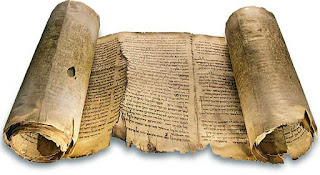Sunday Spotlight: THE CANON
THE CANON of science fiction has been a focus of attention in recent years. Everyone, particularly John Scalzi and Camestros Falton has written about it and criticized it.
But what IS it, exactly?
We typically use the word "Canon" to describe that which is part of the accepted collection of stories. It comes from the Christian tradition of "Canon" referring to the 66 books of the Protestant Bible as the "Canon" of Scripture. (Catholics list 73 books as Scriptural "Canon.")
By the same logic, that which is "official" is "Canon" in other contexts, and that which is non-official is "non-canonical." So, for example, Joss Whedon's continuation of Firefly in comic books would be considered "Canonical," because it was written (at least partially) by Joss Whedon himself. Or the Star Wars Saga would consider The Clone Wars "Canonical," because they're part of the official storyline, even though they're animation. Other Star Wars stories may be considered merely as "expanded universe" tales. The lowest-ranking stories are "apocrypha," or, as we call it today, merely "fan-fic."
But the "Canon" of science fiction as a whole is different. That particular version of Canon refers to the stories and novels of the past that were once considered great, and should therefore be lauded forevermore. These would be, for example, the foundational writers, Shelly, Verne, and Wells; the Pulp Era giants, Edomnd Hamilton, Leigh Brackett, Clifford Simak, Karel Capek, E.E. "Doc" Smith, Philip Wylie; the Golden Age greats, Isaac Asimov, Robert A. Heinlein, Arthur C. Clarke, Ray Bradbury, along with Alfred Bester, John Wyndham, L. Sprague De Camp, or Theodore Sturgeon; The New Wave writers, Samuel R. Delany, Philip K. Dick, Frank Herbert, Octavia Butler, Anne McCaffrey, Ursula K. LeGuin, Larry Niven, Kurt Vonnegut; or even the more recent Cyberpunk Era masters, Orson Scott Card, Kim Stanley Robinson, Robert J. Sawyer, Neal Stephenson, Connie Willis, and Vernor Vinge. Included among these are the former gatekeepers to the genre: Hugo Gernsbeck, Damon Knight, John W. Campbell, Judith Merrill, George Pal, and Kate Wilhelm.
Knowing about and acknowledging these genre-builders has become something of a secret password to the world of science fiction success. For example, Jo Walton's 2011 fantasy novel, Among Others, was a shoo-in for the Hugo Award virtually on the strength of referencing these old greats of SF alone. (It was also a great book, don't get me wrong.) By knowing all about these greats of the past while glad-handing at the Hugo Awards, one can easily build rapport among the insiders and judges. If they find you to be one who has acknowledged these greats, whom they grew up reading, you are considered a person of merit. It's as if they say, "We'll let you play with us, but first you must kiss the feet of our idols."
Today's young writers utterly reject this notion. Yes, these former greats were indeed great, but they were also former. They wrote using a writing style which is archaic by today's standards, and so those who read much from that era tend to emulate the same outmoded prose, which no longer appeals. Today's writers are more influenced by the alluring, attention-grabbing writers of today: J.K. Rowling, Stephen King, James Patterson, Dean Koontz, and the innumerable YA fiction writers of the 90's and naughties.
Furthermore (and in the end, this is much more important), many of these former greats had outlooks and personalities which were heinous by today's measure. John W. Campbell, particularly, was a deplorable racist and misogynist (even a fascist, as Jeannete Ng once pointed out). Gernsbeck was notoriously stodgy to the point of sometimes not even paying his writers. Frederik Pohl was a cantankerous old man who often yelled at people during the Hugo Awards. Robert Heinlein's writings revealed him to be a remarkable pervert. Isaac Asimov gave a speech at a WorldCon about how to "properly" grab the ass of a woman during the awards ceremony. Harlan Ellison once grabbed Connie Willis' breast during a Hugo ceremony - while on stage!
It's no wonder many of today's Hugo Winners reject paying homage to "The Canon" as the necessary price of admission.
It was during the 2019 Hugo Awards in Ireland that the next generation of writers really began to exercise their muscle. As usual, the older writers were horrified. The younger Transhumanist Era writers, particularly the "Ultra Fans" such as John Scalzi and Cory Doctorow, embraced the change.
All in all, it seems that today's writers have rejected the need to idolize the great writers of the past, and perhaps that's for the better. It is for sci fi historians like myself to keep such a torch lit. And one does not need to read Moby Dick in order to write the next Great American Novel. One needs only the literary skill and an innate ability appeal to today's readers.
One can hardly get that from looking too closely at the past, and not enough to the future, especially in the genre of science fiction.
Eric
*




Comments
Post a Comment